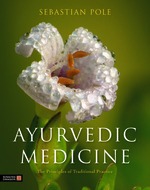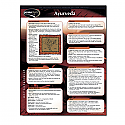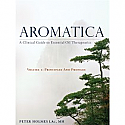Ayurvedic Medicine

Ayurvedic Medicine
| SKU | SD183 | |
| Brand | Singing Dragon | |
| Unit Size | 246mm x 189mm / 10in x 7.5in, 400pp | |
| Properties | September 2012, Hardback, $75.00, ISBN: 978-1-84819-113-6 | |
| English name | Ayurvedic Medicine | |
| Description | Ayurvedic MedicineThe Principles of Traditional PracticeSebastian PoleAyurvedic Medicine clearly and comprehensively presents the unique theories and traditions of Ayurveda making them accessible to the health practitioner of today. With a brief history of traditional medicine in India and discussion of principles, treatment strategies and traditional Ayurvedic pharmacy and pharmacology, the book offers an essential overview of the culture in which Ayurveda has developed and the scientific basis behind this holistic approach. It details over 100 plant profiles of Ayurvedic herbs, with images of fresh and dried plants, and 50 traditional formulas, including characteristics, usage, combinations, contraindications, and safety and dosage information for each. This essential resource explains the traditional medical system of Ayurveda, and provides guidance to students and practitioners on how to incorporate herbal medicine into their life and practice. ContentsAbout the Author. Dedication. Preface. Acknowledgements. Abbreviations. Introduction. Part I. 1. The History of Ayurveda and the Growth of the Materia Medica. 2. The Basic Principles of Ayurveda. 3. Ayurvedic Herbal Pharmacology and Pharmacy.: Dravyaguna and Bhaisajya Vyakhyana. 4. Ayurvedic Therapy and Treatment: Cikitsa. Case Studies. 5. The Scientific Basis of Ayurveda. Part II. 6. Plant Profiles. Plant Profile Template. Ajmoda. Ajwain. Aloe. Amalaki. Anthrapachaka. Aragvadha. Arjuna. Askoka. Ashwagandha. Bakuchi. Bala. Bhallataka. Bhringaraja. Bhumiamalaki. Bibhitaki. Bilva. Brahmi. Cardamon. Castor. Chiretta. Chitraka. Chrysanthemum. Cinnamon. Cloves. Coleus. Coriander. Cumin. Damanaka. Daruharidra. Devadaru. Dhattura. Ephedra. Fennel. Fenugreek. Frankincense (Indian). Garlic. Ginger. Gokshura. Gotu Kola. Guduchi. Guggulu. Gurmar. Haritaki. Hemp Seed. Hingu. Jasmine. Jatamamsi. Kalamegha. Kanchanara. Kapikacchu. Karavella. Krishna Jiraka. Kushtha. Kutaja. Kutki. Lemon and Lime. Lemongrass. Licorice. Lotus. Manjishtha. Mint. Mustaka. Mustard Seed. Myrrh. Neem. Nutmeg. Pepper. Pippali. Pit Shirisha. Pomegranate. Psyllium. Punarnava. Pushkaramoola. Rhubarb. Rose. Safed Musali. Safflower. Saffron. Salt. Sandalwood. Sariva. Sarpagandha. Senna. Shankhapushpi. Shatavari. Shilajit. Tagarah. Tila. Trivrut. Tulsi. Turmeric. Vacha. Vamsa Lochana. Varuna. Vasa. Vidanga. Vidari. 7. 52 Common Ayurvedic Formulas. Asava, Arista: Medicated Wines. Avaleha: Medicinal Jams. Curna: Powder Preparations. Pusyanuga Curna. Guggulu: Pills made with Commiphora Mukul. Kvatha: Decoctions. Siddha Ghrta: Medicated Ghees. Siddha Taila: Medicated Oils. Vati: Tablets. Part III. Appendix 1: Tables. Appendix 2: Treatment Glossary. Appendix 3: Glossary of Terms. Appendix 4: Resources. Appendix 5: Bibliography. Appendix 6: Index of Plant Names. Appendix 7: A Note on the Transliteration and Pronunciation of the Sounds. Index. Reviews"At last, a truly excellent Ayurvedic textbook, ideal for herbal practitioners and students alike as well as for other healthcare practitioners, enabling not only a proper understanding of Ayurvedic principles, but also providing a practical materia medica as a vital reference during practice. This is a book that goes far beyond the many more superficial books so far available on Ayurveda and other available textbooks on Ayurvedic herbs that present a largely Western pharmacological approach while neglecting the Ayurvedic applications." - Annie McIntyre, FNIMH, MAPA, Ayur HC, Practising Medical Herbalist, UK "For the western herbal clinician this book by Sebastian Pole represents an ideal and valuable introduction to the complex discipline of Ayurveda. Written in a clear, logical and accurate manner by an author who is well-versed in both Ayurveda and western herbalism, it outlines the basic principles of philosophy, diagnosis and treatment as well as the individual properties of the extensive Ayurvedic materia medica. No doubt serious students of Ayurveda will find it essential reading." - Kerry Bone, BSc (Hons), Dip Phyto, FNIMH, FNHAA, AHG, MCPP, FANTA, Principal of the Australian College of Phytotherapy and Associate Professor in the School of Health at the University of New England "Pole has created a multi-faceted text on Ayurvedic herbs and their medicinal use. The structure of the text is in two major parts. In the first part, he discusses the foundations, principles, and tenets of Ayurveda. This offers a solid foundation for the utilization of part two in which 150 herbs and formulas are profiled. […] The whole text, beautifully presented […], is a treasure that belongs in the library of every student and practitioner!" - Light on Ayurveda Journal (LOAJ), Vol. VI, Issue 3 Author informationSebastian Pole, Lic OHM, Ayur HC, is an Ayurvedic Practitioner and Chinese Herbalist working in Bath, UK, and is also a passionate ecologist. He is a member of the Ayurvedic Practitioners Association and former Director of the Pharmacopoeia Committee, as well as a member of the Register of Chinese Herbal Medicine. He has spent many years living in India studying Ayurveda and Yoga, has a degree in Hindi and Indian Religions and is a qualified yoga teacher. Sebastian is the Herbal Director and founding partner of Pukka Herbs, The Organic Ayurvedic Herb Specialists. |
|



